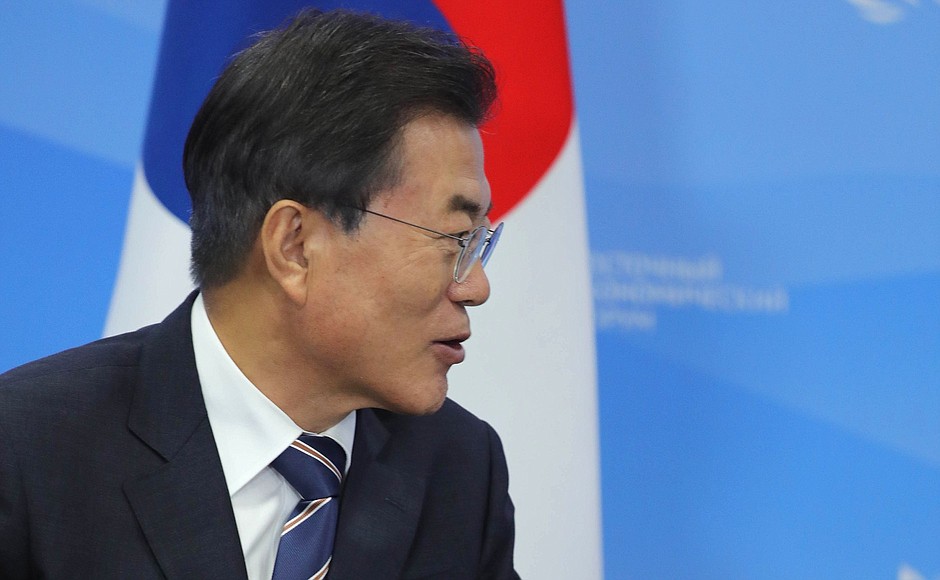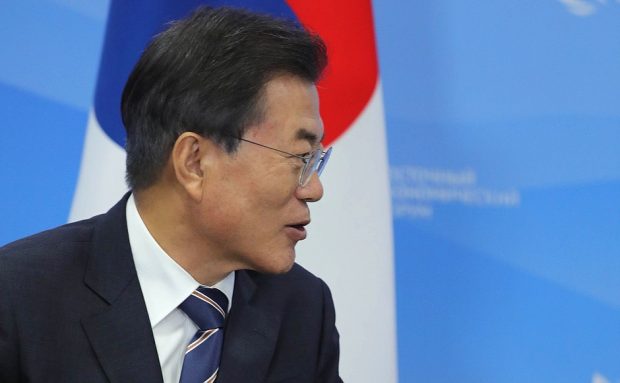
Moon says strong alliance behind continued dialogue mood with N. Korea
President Moon Jae-in said Tuesday that a unified and cool-headed response by South Korea and the United States to North Korea’s recent missile firing has helped maintain the momentum of dialogue. In a luncheon meeting with top military commanders of the allies at Cheong Wa Dae in Seoul, the president also cited “personal trust” between President Donald Trump and North Korean leader Kim Jong-un and a summit-led change in regional security conditions. “I think that the firmness of the South Korea-U.S. alliance and close coordination between the two nations have quite shined in their response to North Korea’s launches of projectiles,” he said. Referring to some of the projectiles in Korean, he used an ambiguous expression that could be heard as “dando (ballistic),” but his office, Cheong Wa Dae, later said he meant “dangeori (short-range).”
On the basis of a prepared text of Moon’s opening statement, in fact, his translator used the words “short-range missile.” Cheong Wa Dae’s formal stance is that the allies are still analyzing the exact types of projectiles that the secretive communist nation fired earlier this month. A ballistic missile launch by the North would constitute a violation of U.N. Security Council resolutions. Moon added that Seoul and Washington have kept the dialogue momentum alive by responding to Pyongyang’s behavior in a “calm and moderate” voice. He emphasized the importance of the alliance in the peace-building process on the peninsula. “Even if peace is established on the Korean Peninsula with the power of the South Korea-U.S. alliance, the role of the alliance will remain important in the peace and stability of all of Northeast Asia,” Moon said.
In that sense, he added, the alliance is not provisional but permanent. “Let’s go together until the end for a great alliance between South Korea and the U.S.,” he said. Present at the meeting were Defense Minister Jeong Kyeong-doo and Gen. Robert Abrams, chief of the U.S. Forces Korea (USFK). Moon said the alliance has become stronger since Abrams assumed the post last November, noting his father, formerly Army chief of staff, was a Korean War veteran. The USFK chief said South Korea’s military “enjoys historic levels of resourcing” under the Moon administration, which “makes our alliance stronger and prepares us for any potential crisis or future threat.” The other U.S. commanders who attended the meeting were USFK Deputy Commander Lt. Gen. Kenneth S. Wilsbach, USFK Assistant Chief of Staff for Plans and Policy Maj. Gen. James W. Lukeman, Special Operations Command Korea Commander Maj. Gen. Tony D. Bauernfeind and the Eighth Army’s Deputy Commander Brig. Gen. Patrick J. Donahoe. Also on hand were Gen. Park Han-ki, chairman of South Korea’s Joint Chiefs of Staff, the commanding generals of the country’s army, navy and air force, and Gen. Choi Byung-hyuk, deputy commander of the allies’ Combined Forces Command.
By Lee Chi-dong
(Yonhap)



